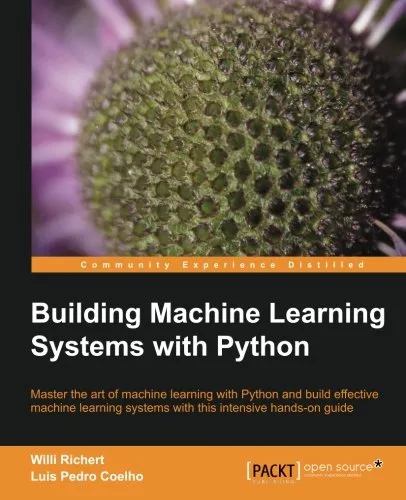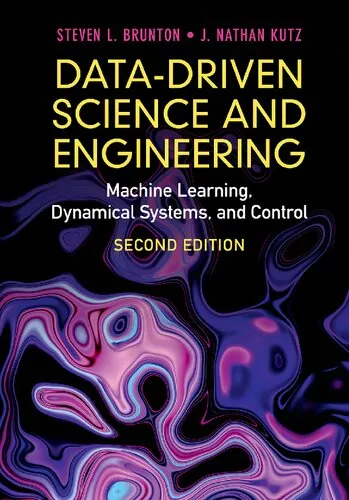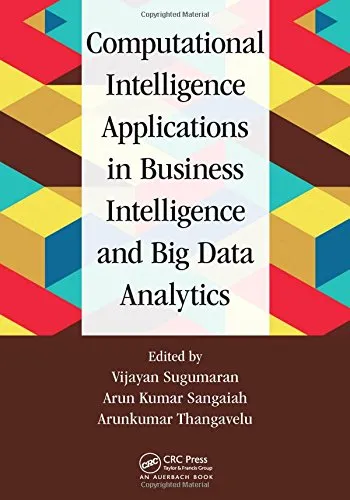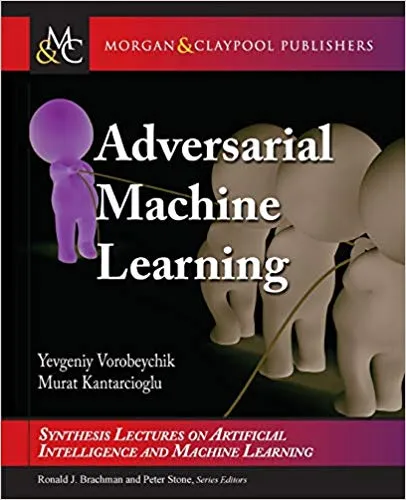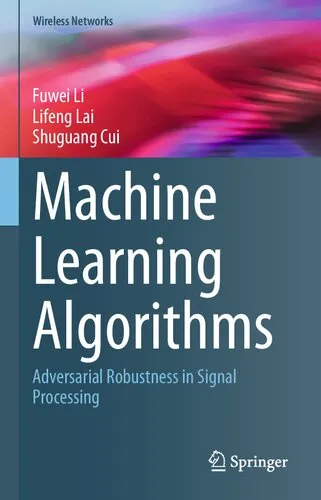Adversarial Machine Learning: Attack Surfaces, Defence Mechanisms, Learning Theories in Artificial Intelligence
4.0
بر اساس نظر کاربران

شما میتونید سوالاتتون در باره کتاب رو از هوش مصنوعیش بعد از ورود بپرسید
هر دانلود یا پرسش از هوش مصنوعی 2 امتیاز لازم دارد، برای بدست آوردن امتیاز رایگان، به صفحه ی راهنمای امتیازات سر بزنید و یک سری کار ارزشمند انجام بدینRelated Refrences:
معرفی کتاب "Adversarial Machine Learning: Attack Surfaces, Defence Mechanisms, Learning Theories in Artificial Intelligence"
کتاب Adversarial Machine Learning: Attack Surfaces, Defence Mechanisms, Learning Theories in Artificial Intelligence اثری جامع و قابلتأمل در زمینه فناوری و پژوهشهای هوش مصنوعی (AI) است که به طور خاص روی مباحث دفاع و حمله در یادگیری ماشین (ML) تمرکز دارد. نوشته این کتاب توسط Aneesh Sreevallabh Chivukula، Xinghao Yang، Bo Liu، Wei Liu و Wanlei Zhou به همراه مشارکتهای علمی پیشرفته نگارش شده است.
در دنیای امروز، یادگیری ماشین به قلب بسیاری از سیستمهای هوشمند تبدیل شده است. با این حال، امنیت در مقابل حملات adversarial یک چالش جدی است. این کتاب با نگاهی نوآورانه و تخصصی، برخی از اساسیترین جنبههای حملات و تکنیکهای دفاع در مدلهای هوش مصنوعی را معرفی میکند و به بررسی نظریههای یادگیری میپردازد. این رویکرد ترکیبی از دیدگاههای نظری، ابزارهای عملی و شرح مثالهایی کاربردی است که درک عمیقتری از رفتارهای پیچیده مدلهای هوش مصنوعی ارائه میدهد.
خلاصهای از کتاب
این کتاب در سه بخش اصلی ساختاربندی شده است که تمامی جنبههای مهم یادگیری ماشین adversarial را پوشش میدهد:
- Attack Surfaces: در این بخش، خصوصیات آسیبپذیری مدلهای هوش مصنوعی تشریح میشود، از جمله حملات مختلفی نظیر evasion attacks، data poisoning و model inference attacks که به راحتی سیستمهای AI را میتوانند دچار خطا کنند.
- Defence Mechanisms: ابزارها و استراتژیهای مختلف برای جلوگیری یا کاهش تأثیر حملات adversarial، مانند adversarial training، gradient masking و input preprocessing، به تفصیل شرح داده شدهاند.
- Learning Theories: این بخش به اصول تئوری در یادگیری ماشین اختصاص دارد، از جمله مفاهیم پایهای درباره generalization، robustness و model interpretability.
ترکیب این دیدگاهها به شما اجازه میدهد که نه تنها سیستمهای مقاومتری طراحی کنید، بلکه حملات بالقوه را نیز بهتر تشخیص دهید.
نکات کلیدی
خواندن این کتاب به شما کمک میکند تا:
- شناخت دقیقتری از انواع حملات adversarial داشته باشید.
- راهحلهای عملی و نظری برای دفاع از مدلهای یادگیری ماشین را کشف کنید.
- درک بهتری از مفاهیم پیشرفته یادگیری ماشین و نظریههای مرتبط بهدست آورید.
- قادر باشید سیستمهای هوش مصنوعی را که نه تنها کارآمد بلکه مقاوم هم هستند طراحی کنید.
این کتاب بهویژه برای کسانی که در زمینه امنیت سایبری، یادگیری ماشین یا تحقیقات هوش مصنوعی کار میکنند، یک منبع ارزشمند محسوب میشود.
جملات معروف از کتاب
"Adversarial machine learning is not just a technical challenge; it is a paradigm shift for understanding the limitations of our AI models."
"True robustness comes not from avoiding attacks, but from learning how to adapt and thrive in hostile environments."
"The future of AI depends on how well we can secure its foundations."
چرا این کتاب مهم است؟
یادگیری ماشین adversarial موضوعی است که بهسرعت در حال اهمیت یافتن است. با افزایش استفاده از سیستمهای هوش مصنوعی در حوزههایی مانند پزشکی، حمل و نقل، مالی و امنیت، حفظ اعتماد و اطمینان به عملکرد این سیستمها ضروریتر از همیشه شده است.
این کتاب نه تنها چارچوبی برای درک بهتر چالشهای موجود ارائه میدهد، بلکه به شما این فرصت را میدهد که با ابزارها و دانش لازم برای مقابله با تهدیدات adversarial مجهز شوید. بهواسطه شیوه نگارش علمی و سازمانیافته آن، این اثر میتواند به عنوان یکی از مهمترین منابع درسی و تحقیقاتی در این حوزه تلقی شود.
Introduction
The field of machine learning has revolutionized diverse sectors worldwide, from healthcare and finance to transportation and natural language processing. But as the reliance on machine learning grows, so does the understanding that these systems are vulnerable to adversarial attacks. "Adversarial Machine Learning: Attack Surfaces, Defence Mechanisms, Learning Theories in Artificial Intelligence" serves as a definitive guide to understanding, assessing, and countering adversarial threats in artificial intelligence systems. This comprehensive book is designed for researchers, practitioners, and students, offering a deep dive into the evolving landscape of adversarial machine learning (AML).
The authors—Aneesh Sreevallabh Chivukula, Xinghao Yang, Bo Liu, Wei Liu, and Wanlei Zhou—collaboratively present an engaging narrative filled with cutting-edge insights and thoroughly researched methodologies. With a unique blend of theoretical foundations, practical applications, and future directions, this book not only enhances one's understanding of AML but also motivates the development of robust AI systems.
Detailed Summary of the Book
The book begins with an overview of adversarial machine learning, contextualizing the prevalence and severity of adversarial attacks. It explores the unique vulnerabilities within modern AI systems, including image recognition models, speech synthesis frameworks, and reinforcement learning environments. The authors categorize attack surfaces into various dimensions, such as evasion, poisoning, and inference attacks.
Moving forward, the book provides a systematic explanation of defence mechanisms across multiple domains, guided by the latest state-of-the-art research. Techniques such as adversarial training, robust optimization, defensive distillation, and input transformation are detailed through practical explanations and mathematical formulations. Readers are also introduced to real-world scenarios where adversarial attacks have led to critical system failures, emphasizing the high stakes of AML vulnerabilities.
One of the most standout sections is the emphasis on learning theories in AI, which underpin both defensive and offensive strategies in AML. The authors analyze the interplay between deep learning architectures and adversarial robustness, offering valuable insights into the limitations of modern AI systems. Through in-depth case studies, readers glean lessons that link academic research to industry applications.
The narrative concludes with a forward-looking discussion of the ethical, social, and technological implications of adversarial machine learning. The authors highlight open challenges, call for collaboration across disciplines, and envision the future trajectory of robust AI systems.
Key Takeaways
- A clear understanding of the attack surfaces that adversaries exploit in AI systems, with examples from various industries.
- Comprehensive coverage of defensive mechanisms and tools available today, explained with practical examples and applications.
- Insight into the theoretical underpinnings of adversarial behavior in AI, linking fundamental principles to applicable strategies.
- Exposure to ethical and societal considerations, inspiring a balanced approach to technology development and deployment.
- A call to action for AI researchers, practitioners, and policymakers to actively engage with the challenges of adversarial machine learning.
Famous Quotes from the Book
"Adversarial machine learning is not merely a challenge; it is an opportunity to fortify AI systems and ensure they truly serve humanity." - Aneesh Sreevallabh Chivukula
"Every vulnerability in AI is not just a crack but a mirror reflecting the unfinished journey of artificial intelligence." - Xinghao Yang
"Striking a balance between innovation and robustness is the cornerstone of building trustworthy AI systems." - Bo Liu
Why This Book Matters
The importance of this book cannot be overstated in the current AI landscape. As artificial intelligence applications continue to integrate into every facet of modern life, the threats posed by adversarial attacks have become one of the most critical challenges in computing today. Without proper understanding and safeguards, the promise of AI could be undermined by malicious actors.
What sets "Adversarial Machine Learning: Attack Surfaces, Defence Mechanisms, Learning Theories in Artificial Intelligence" apart is its holistic approach. It doesn't just focus on the technical aspects but contextualizes the broader implications of adversarial vulnerabilities. By bridging the gap between academia and industry, the book fosters collaboration and inspires innovation.
Whether you're an AI researcher, an industry practitioner, or a policymaker, this book equips you with the knowledge and tools to address the pressing challenges of adversarial machine learning. It's not just a guide—it's a call to action for safeguarding the future of AI and its role in society.
دانلود رایگان مستقیم
شما میتونید سوالاتتون در باره کتاب رو از هوش مصنوعیش بعد از ورود بپرسید
دسترسی به کتابها از طریق پلتفرمهای قانونی و کتابخانههای عمومی نه تنها از حقوق نویسندگان و ناشران حمایت میکند، بلکه به پایداری فرهنگ کتابخوانی نیز کمک میرساند. پیش از دانلود، لحظهای به بررسی این گزینهها فکر کنید.
این کتاب رو در پلتفرم های دیگه ببینید
WorldCat به شما کمک میکنه تا کتاب ها رو در کتابخانه های سراسر دنیا پیدا کنید
امتیازها، نظرات تخصصی و صحبت ها درباره کتاب را در Goodreads ببینید
کتابهای کمیاب یا دست دوم را در AbeBooks پیدا کنید و بخرید
1534
بازدید4.0
امتیاز0
نظر98%
رضایتنظرات:
4.0
بر اساس 0 نظر کاربران
Questions & Answers
Ask questions about this book or help others by answering
No questions yet. Be the first to ask!


